Analysis of Liberalism in International Relations Theory
VerifiedAdded on 2022/09/14
|6
|1455
|46
Essay
AI Summary
This essay examines liberalism as a theory within international relations, focusing on its core principles of rejecting power politics, promoting international cooperation, and emphasizing the role of non-governmental actors. The essay analyzes the article "Human Rights in the Context of the Changing Order," highlighting the shift in the global order and the decline of human rights. It explores how liberalism, with its emphasis on cooperation and free trade, is being challenged by the rise of populism and authoritarian states. The essay discusses the importance of democracy, the role of international institutions, and the potential impact of emerging global powers with poor human rights records on the future of liberalism and the international order. It emphasizes the interconnectedness of economies and the reduced likelihood of conflict through international trade, while also pointing out the weakening of the liberal order and its implications for human rights globally. The analysis also touches upon the rise of populism and its impact on human rights, as well as the role of authoritarian states in shaping the new world order.
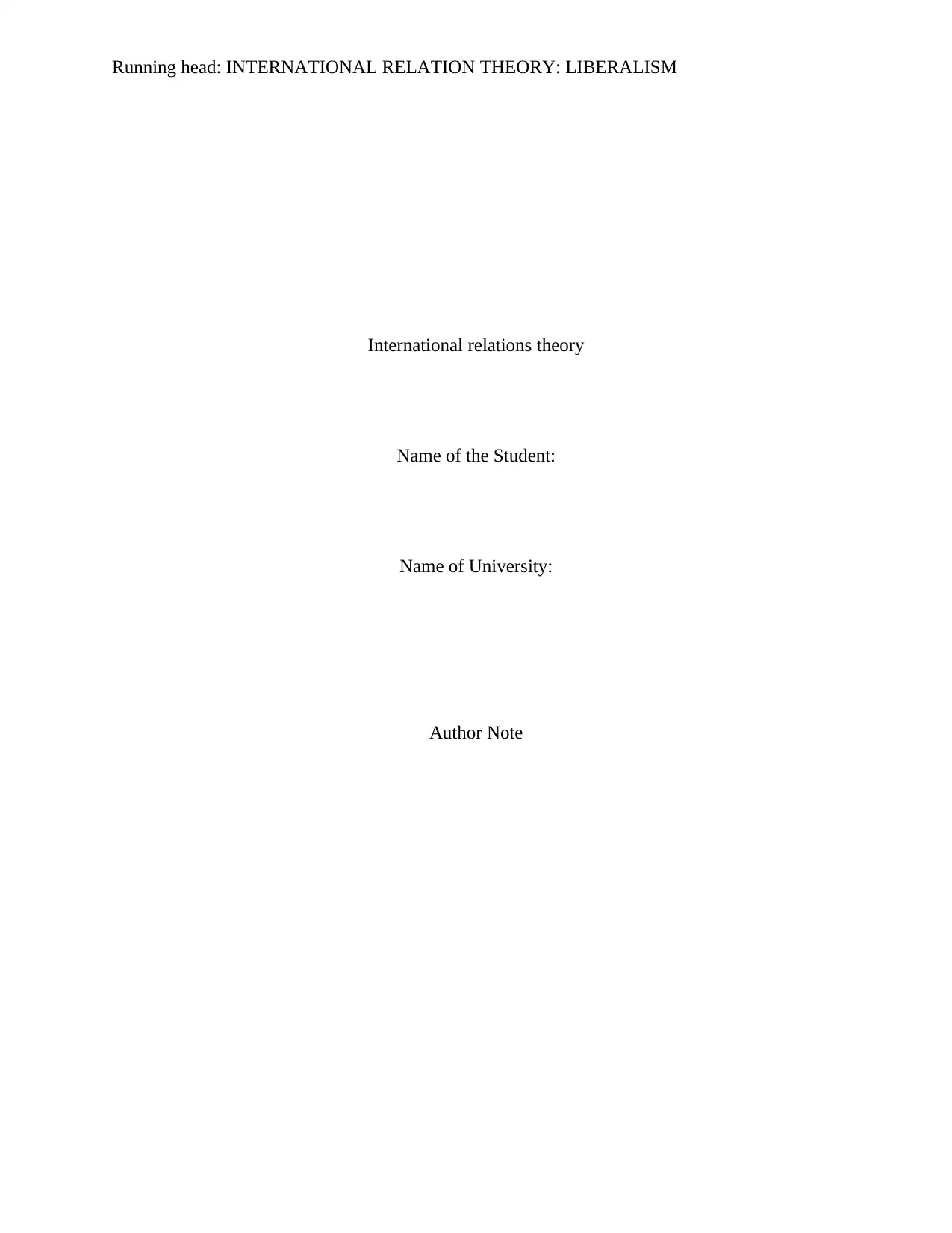
Running head: INTERNATIONAL RELATION THEORY: LIBERALISM
International relations theory
Name of the Student:
Name of University:
Author Note
International relations theory
Name of the Student:
Name of University:
Author Note
Paraphrase This Document
Need a fresh take? Get an instant paraphrase of this document with our AI Paraphraser
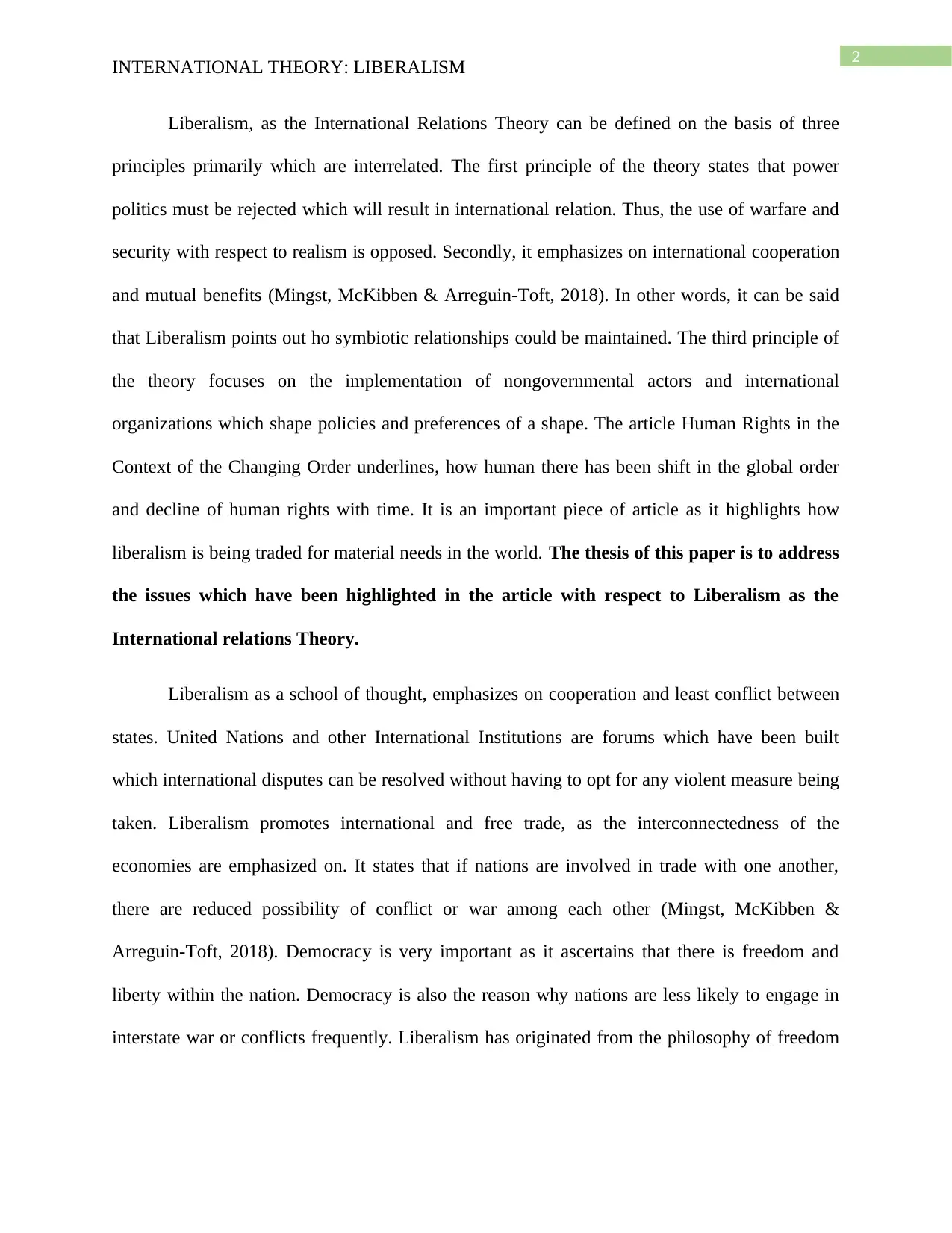
2
INTERNATIONAL THEORY: LIBERALISM
Liberalism, as the International Relations Theory can be defined on the basis of three
principles primarily which are interrelated. The first principle of the theory states that power
politics must be rejected which will result in international relation. Thus, the use of warfare and
security with respect to realism is opposed. Secondly, it emphasizes on international cooperation
and mutual benefits (Mingst, McKibben & Arreguin-Toft, 2018). In other words, it can be said
that Liberalism points out ho symbiotic relationships could be maintained. The third principle of
the theory focuses on the implementation of nongovernmental actors and international
organizations which shape policies and preferences of a shape. The article Human Rights in the
Context of the Changing Order underlines, how human there has been shift in the global order
and decline of human rights with time. It is an important piece of article as it highlights how
liberalism is being traded for material needs in the world. The thesis of this paper is to address
the issues which have been highlighted in the article with respect to Liberalism as the
International relations Theory.
Liberalism as a school of thought, emphasizes on cooperation and least conflict between
states. United Nations and other International Institutions are forums which have been built
which international disputes can be resolved without having to opt for any violent measure being
taken. Liberalism promotes international and free trade, as the interconnectedness of the
economies are emphasized on. It states that if nations are involved in trade with one another,
there are reduced possibility of conflict or war among each other (Mingst, McKibben &
Arreguin-Toft, 2018). Democracy is very important as it ascertains that there is freedom and
liberty within the nation. Democracy is also the reason why nations are less likely to engage in
interstate war or conflicts frequently. Liberalism has originated from the philosophy of freedom
INTERNATIONAL THEORY: LIBERALISM
Liberalism, as the International Relations Theory can be defined on the basis of three
principles primarily which are interrelated. The first principle of the theory states that power
politics must be rejected which will result in international relation. Thus, the use of warfare and
security with respect to realism is opposed. Secondly, it emphasizes on international cooperation
and mutual benefits (Mingst, McKibben & Arreguin-Toft, 2018). In other words, it can be said
that Liberalism points out ho symbiotic relationships could be maintained. The third principle of
the theory focuses on the implementation of nongovernmental actors and international
organizations which shape policies and preferences of a shape. The article Human Rights in the
Context of the Changing Order underlines, how human there has been shift in the global order
and decline of human rights with time. It is an important piece of article as it highlights how
liberalism is being traded for material needs in the world. The thesis of this paper is to address
the issues which have been highlighted in the article with respect to Liberalism as the
International relations Theory.
Liberalism as a school of thought, emphasizes on cooperation and least conflict between
states. United Nations and other International Institutions are forums which have been built
which international disputes can be resolved without having to opt for any violent measure being
taken. Liberalism promotes international and free trade, as the interconnectedness of the
economies are emphasized on. It states that if nations are involved in trade with one another,
there are reduced possibility of conflict or war among each other (Mingst, McKibben &
Arreguin-Toft, 2018). Democracy is very important as it ascertains that there is freedom and
liberty within the nation. Democracy is also the reason why nations are less likely to engage in
interstate war or conflicts frequently. Liberalism has originated from the philosophy of freedom
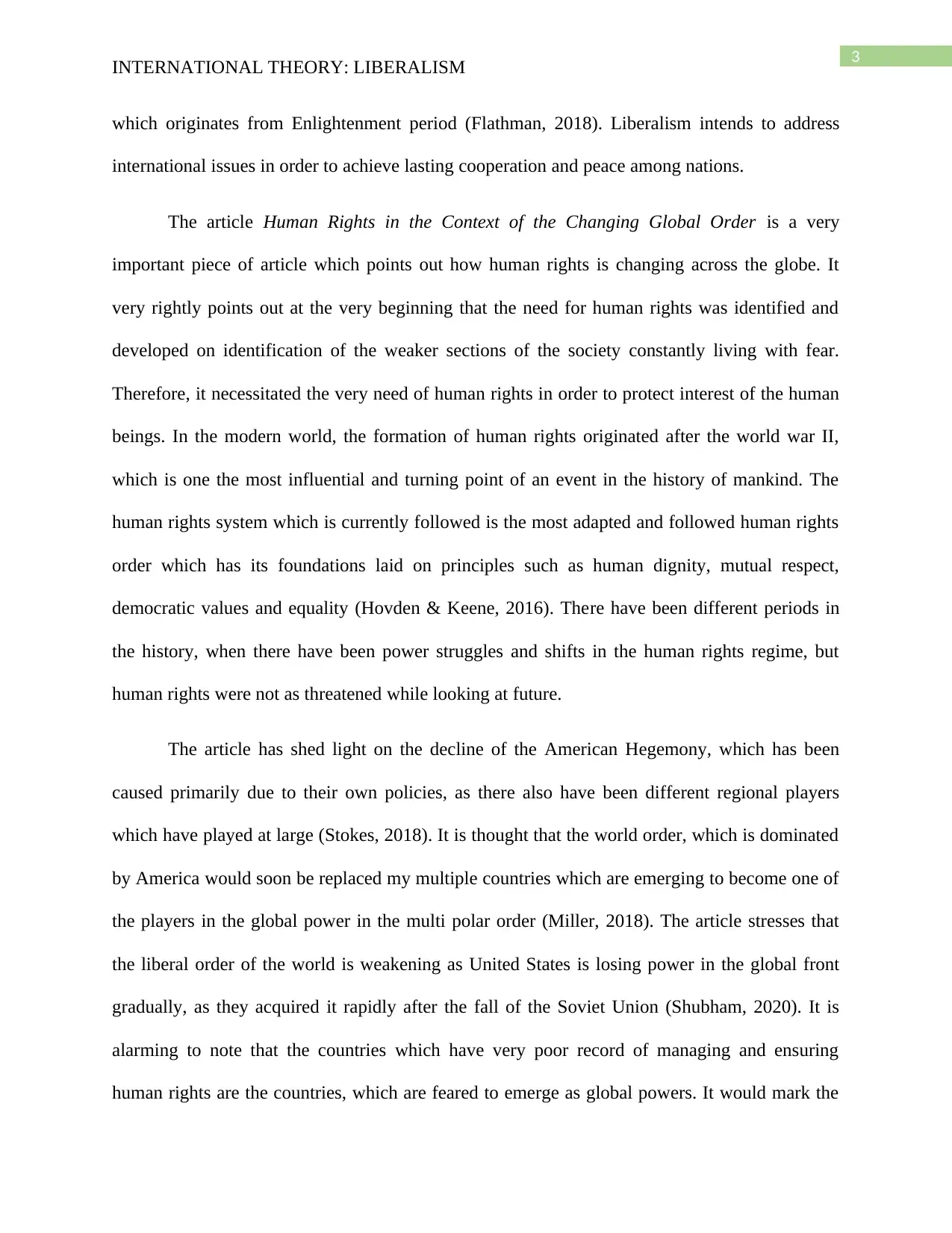
3
INTERNATIONAL THEORY: LIBERALISM
which originates from Enlightenment period (Flathman, 2018). Liberalism intends to address
international issues in order to achieve lasting cooperation and peace among nations.
The article Human Rights in the Context of the Changing Global Order is a very
important piece of article which points out how human rights is changing across the globe. It
very rightly points out at the very beginning that the need for human rights was identified and
developed on identification of the weaker sections of the society constantly living with fear.
Therefore, it necessitated the very need of human rights in order to protect interest of the human
beings. In the modern world, the formation of human rights originated after the world war II,
which is one the most influential and turning point of an event in the history of mankind. The
human rights system which is currently followed is the most adapted and followed human rights
order which has its foundations laid on principles such as human dignity, mutual respect,
democratic values and equality (Hovden & Keene, 2016). There have been different periods in
the history, when there have been power struggles and shifts in the human rights regime, but
human rights were not as threatened while looking at future.
The article has shed light on the decline of the American Hegemony, which has been
caused primarily due to their own policies, as there also have been different regional players
which have played at large (Stokes, 2018). It is thought that the world order, which is dominated
by America would soon be replaced my multiple countries which are emerging to become one of
the players in the global power in the multi polar order (Miller, 2018). The article stresses that
the liberal order of the world is weakening as United States is losing power in the global front
gradually, as they acquired it rapidly after the fall of the Soviet Union (Shubham, 2020). It is
alarming to note that the countries which have very poor record of managing and ensuring
human rights are the countries, which are feared to emerge as global powers. It would mark the
INTERNATIONAL THEORY: LIBERALISM
which originates from Enlightenment period (Flathman, 2018). Liberalism intends to address
international issues in order to achieve lasting cooperation and peace among nations.
The article Human Rights in the Context of the Changing Global Order is a very
important piece of article which points out how human rights is changing across the globe. It
very rightly points out at the very beginning that the need for human rights was identified and
developed on identification of the weaker sections of the society constantly living with fear.
Therefore, it necessitated the very need of human rights in order to protect interest of the human
beings. In the modern world, the formation of human rights originated after the world war II,
which is one the most influential and turning point of an event in the history of mankind. The
human rights system which is currently followed is the most adapted and followed human rights
order which has its foundations laid on principles such as human dignity, mutual respect,
democratic values and equality (Hovden & Keene, 2016). There have been different periods in
the history, when there have been power struggles and shifts in the human rights regime, but
human rights were not as threatened while looking at future.
The article has shed light on the decline of the American Hegemony, which has been
caused primarily due to their own policies, as there also have been different regional players
which have played at large (Stokes, 2018). It is thought that the world order, which is dominated
by America would soon be replaced my multiple countries which are emerging to become one of
the players in the global power in the multi polar order (Miller, 2018). The article stresses that
the liberal order of the world is weakening as United States is losing power in the global front
gradually, as they acquired it rapidly after the fall of the Soviet Union (Shubham, 2020). It is
alarming to note that the countries which have very poor record of managing and ensuring
human rights are the countries, which are feared to emerge as global powers. It would mark the
⊘ This is a preview!⊘
Do you want full access?
Subscribe today to unlock all pages.

Trusted by 1+ million students worldwide
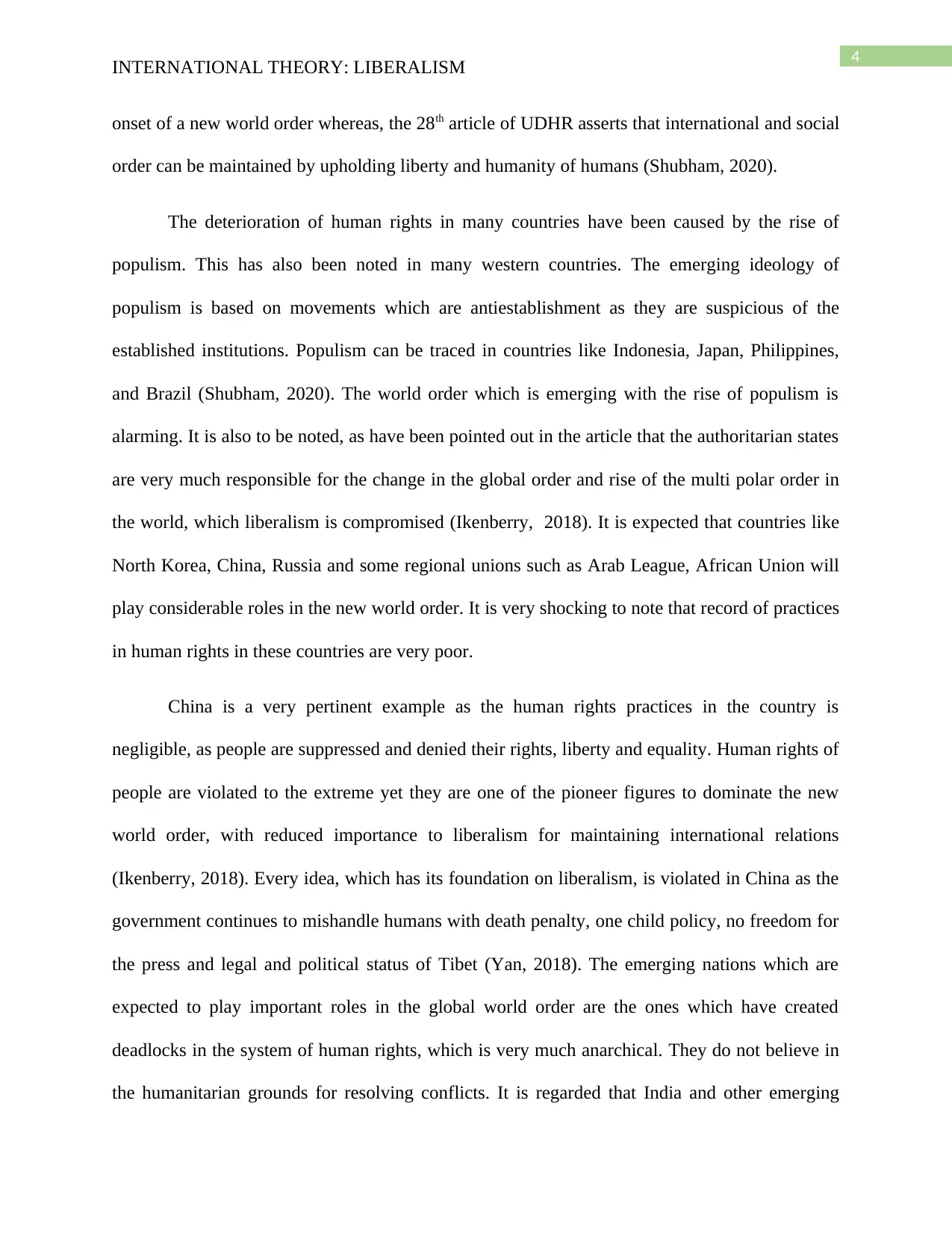
4
INTERNATIONAL THEORY: LIBERALISM
onset of a new world order whereas, the 28th article of UDHR asserts that international and social
order can be maintained by upholding liberty and humanity of humans (Shubham, 2020).
The deterioration of human rights in many countries have been caused by the rise of
populism. This has also been noted in many western countries. The emerging ideology of
populism is based on movements which are antiestablishment as they are suspicious of the
established institutions. Populism can be traced in countries like Indonesia, Japan, Philippines,
and Brazil (Shubham, 2020). The world order which is emerging with the rise of populism is
alarming. It is also to be noted, as have been pointed out in the article that the authoritarian states
are very much responsible for the change in the global order and rise of the multi polar order in
the world, which liberalism is compromised (Ikenberry, 2018). It is expected that countries like
North Korea, China, Russia and some regional unions such as Arab League, African Union will
play considerable roles in the new world order. It is very shocking to note that record of practices
in human rights in these countries are very poor.
China is a very pertinent example as the human rights practices in the country is
negligible, as people are suppressed and denied their rights, liberty and equality. Human rights of
people are violated to the extreme yet they are one of the pioneer figures to dominate the new
world order, with reduced importance to liberalism for maintaining international relations
(Ikenberry, 2018). Every idea, which has its foundation on liberalism, is violated in China as the
government continues to mishandle humans with death penalty, one child policy, no freedom for
the press and legal and political status of Tibet (Yan, 2018). The emerging nations which are
expected to play important roles in the global world order are the ones which have created
deadlocks in the system of human rights, which is very much anarchical. They do not believe in
the humanitarian grounds for resolving conflicts. It is regarded that India and other emerging
INTERNATIONAL THEORY: LIBERALISM
onset of a new world order whereas, the 28th article of UDHR asserts that international and social
order can be maintained by upholding liberty and humanity of humans (Shubham, 2020).
The deterioration of human rights in many countries have been caused by the rise of
populism. This has also been noted in many western countries. The emerging ideology of
populism is based on movements which are antiestablishment as they are suspicious of the
established institutions. Populism can be traced in countries like Indonesia, Japan, Philippines,
and Brazil (Shubham, 2020). The world order which is emerging with the rise of populism is
alarming. It is also to be noted, as have been pointed out in the article that the authoritarian states
are very much responsible for the change in the global order and rise of the multi polar order in
the world, which liberalism is compromised (Ikenberry, 2018). It is expected that countries like
North Korea, China, Russia and some regional unions such as Arab League, African Union will
play considerable roles in the new world order. It is very shocking to note that record of practices
in human rights in these countries are very poor.
China is a very pertinent example as the human rights practices in the country is
negligible, as people are suppressed and denied their rights, liberty and equality. Human rights of
people are violated to the extreme yet they are one of the pioneer figures to dominate the new
world order, with reduced importance to liberalism for maintaining international relations
(Ikenberry, 2018). Every idea, which has its foundation on liberalism, is violated in China as the
government continues to mishandle humans with death penalty, one child policy, no freedom for
the press and legal and political status of Tibet (Yan, 2018). The emerging nations which are
expected to play important roles in the global world order are the ones which have created
deadlocks in the system of human rights, which is very much anarchical. They do not believe in
the humanitarian grounds for resolving conflicts. It is regarded that India and other emerging
Paraphrase This Document
Need a fresh take? Get an instant paraphrase of this document with our AI Paraphraser
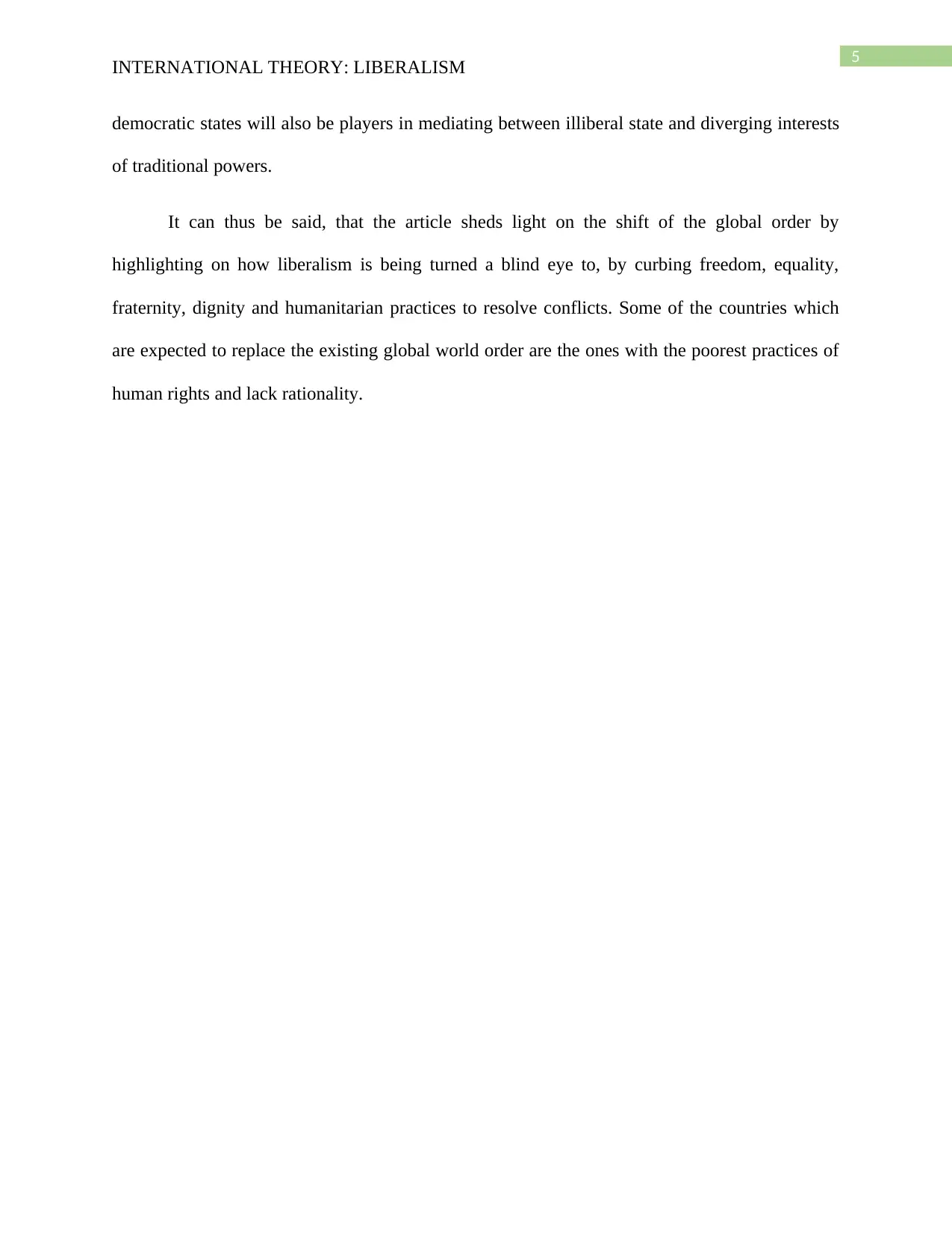
5
INTERNATIONAL THEORY: LIBERALISM
democratic states will also be players in mediating between illiberal state and diverging interests
of traditional powers.
It can thus be said, that the article sheds light on the shift of the global order by
highlighting on how liberalism is being turned a blind eye to, by curbing freedom, equality,
fraternity, dignity and humanitarian practices to resolve conflicts. Some of the countries which
are expected to replace the existing global world order are the ones with the poorest practices of
human rights and lack rationality.
INTERNATIONAL THEORY: LIBERALISM
democratic states will also be players in mediating between illiberal state and diverging interests
of traditional powers.
It can thus be said, that the article sheds light on the shift of the global order by
highlighting on how liberalism is being turned a blind eye to, by curbing freedom, equality,
fraternity, dignity and humanitarian practices to resolve conflicts. Some of the countries which
are expected to replace the existing global world order are the ones with the poorest practices of
human rights and lack rationality.
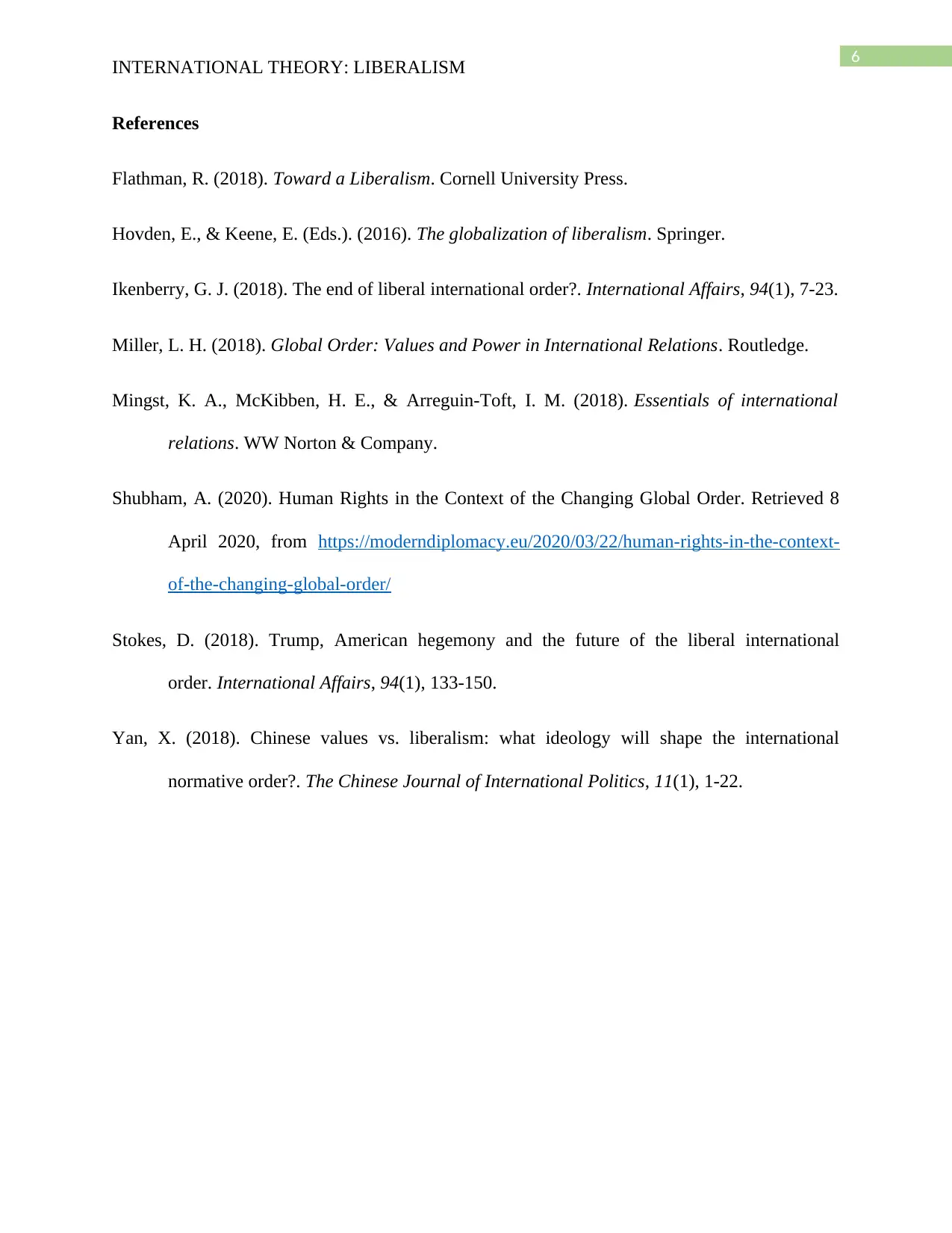
6
INTERNATIONAL THEORY: LIBERALISM
References
Flathman, R. (2018). Toward a Liberalism. Cornell University Press.
Hovden, E., & Keene, E. (Eds.). (2016). The globalization of liberalism. Springer.
Ikenberry, G. J. (2018). The end of liberal international order?. International Affairs, 94(1), 7-23.
Miller, L. H. (2018). Global Order: Values and Power in International Relations. Routledge.
Mingst, K. A., McKibben, H. E., & Arreguin-Toft, I. M. (2018). Essentials of international
relations. WW Norton & Company.
Shubham, A. (2020). Human Rights in the Context of the Changing Global Order. Retrieved 8
April 2020, from https://moderndiplomacy.eu/2020/03/22/human-rights-in-the-context-
of-the-changing-global-order/
Stokes, D. (2018). Trump, American hegemony and the future of the liberal international
order. International Affairs, 94(1), 133-150.
Yan, X. (2018). Chinese values vs. liberalism: what ideology will shape the international
normative order?. The Chinese Journal of International Politics, 11(1), 1-22.
INTERNATIONAL THEORY: LIBERALISM
References
Flathman, R. (2018). Toward a Liberalism. Cornell University Press.
Hovden, E., & Keene, E. (Eds.). (2016). The globalization of liberalism. Springer.
Ikenberry, G. J. (2018). The end of liberal international order?. International Affairs, 94(1), 7-23.
Miller, L. H. (2018). Global Order: Values and Power in International Relations. Routledge.
Mingst, K. A., McKibben, H. E., & Arreguin-Toft, I. M. (2018). Essentials of international
relations. WW Norton & Company.
Shubham, A. (2020). Human Rights in the Context of the Changing Global Order. Retrieved 8
April 2020, from https://moderndiplomacy.eu/2020/03/22/human-rights-in-the-context-
of-the-changing-global-order/
Stokes, D. (2018). Trump, American hegemony and the future of the liberal international
order. International Affairs, 94(1), 133-150.
Yan, X. (2018). Chinese values vs. liberalism: what ideology will shape the international
normative order?. The Chinese Journal of International Politics, 11(1), 1-22.
⊘ This is a preview!⊘
Do you want full access?
Subscribe today to unlock all pages.

Trusted by 1+ million students worldwide
1 out of 6
Related Documents
Your All-in-One AI-Powered Toolkit for Academic Success.
+13062052269
info@desklib.com
Available 24*7 on WhatsApp / Email
![[object Object]](/_next/static/media/star-bottom.7253800d.svg)
Unlock your academic potential
Copyright © 2020–2026 A2Z Services. All Rights Reserved. Developed and managed by ZUCOL.





